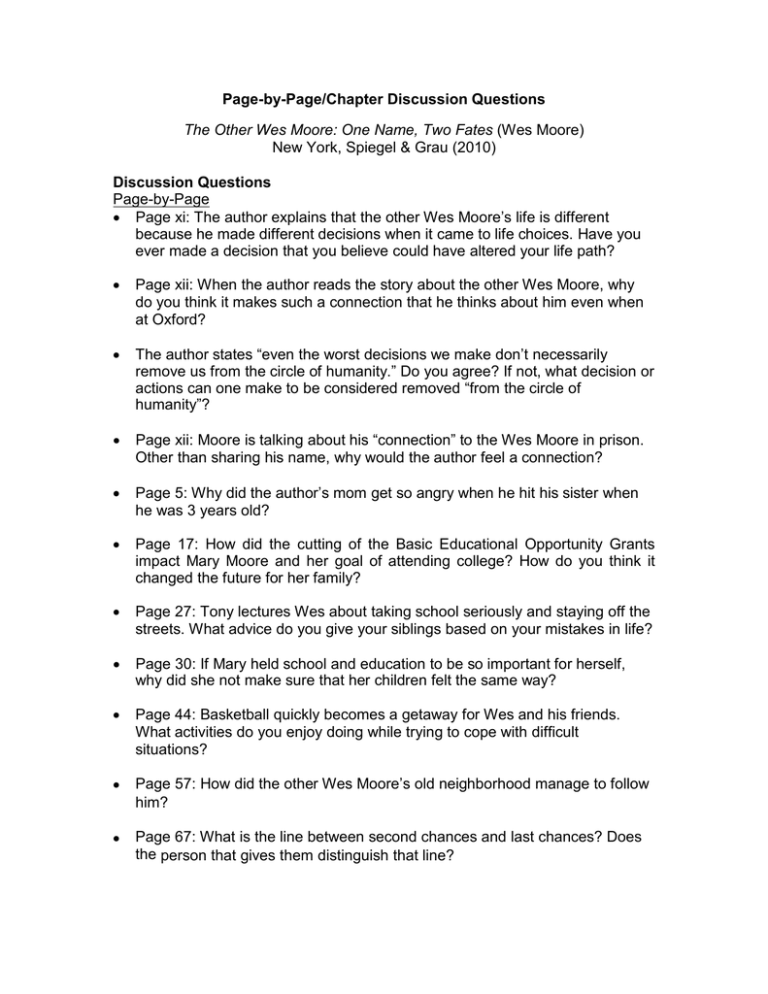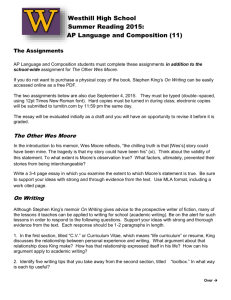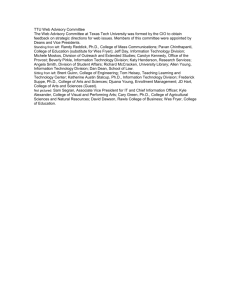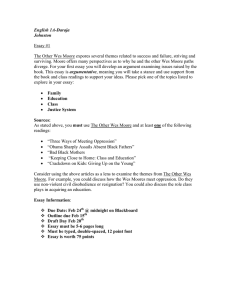Page-by-Page/Chapter Discussion Questions The Other Wes Moore
advertisement

Page-by-Page/Chapter Discussion Questions The Other Wes Moore: One Name, Two Fates (Wes Moore) New York, Spiegel & Grau (2010) Discussion Questions Page-by-Page • Page xi: The author explains that the other Wes Moore’s life is different because he made different decisions when it came to life choices. Have you ever made a decision that you believe could have altered your life path? • Page xii: When the author reads the story about the other Wes Moore, why do you think it makes such a connection that he thinks about him even when at Oxford? • The author states “even the worst decisions we make don’t necessarily remove us from the circle of humanity.” Do you agree? If not, what decision or actions can one make to be considered removed “from the circle of humanity”? • Page xii: Moore is talking about his “connection” to the Wes Moore in prison. Other than sharing his name, why would the author feel a connection? • Page 5: Why did the author’s mom get so angry when he hit his sister when he was 3 years old? • Page 17: How did the cutting of the Basic Educational Opportunity Grants impact Mary Moore and her goal of attending college? How do you think it changed the future for her family? • Page 27: Tony lectures Wes about taking school seriously and staying off the streets. What advice do you give your siblings based on your mistakes in life? • Page 30: If Mary held school and education to be so important for herself, why did she not make sure that her children felt the same way? • Page 44: Basketball quickly becomes a getaway for Wes and his friends. What activities do you enjoy doing while trying to cope with difficult situations? • Page 57: How did the other Wes Moore’s old neighborhood manage to follow him? • Page 67: What is the line between second chances and last chances? Does the person that gives them distinguish that line? • Page 70: How did Tony know that his brother Wes was doing more than DJ’ing to get money? • Page 76: What music played a special role in the other Wes Moore’s life? What role does music play in your life? • Page 93: Wes gets pranked into thinking he could escape military school and go home. Has anyone ever played a trick on you? How did that make you feel? What did Wes learn from the prank? • Page 100: The other Wes Moore needed to tell his mother that he got Alicia pregnant. Have you ever had to give someone news that you knew would break their heart? How did you build up the courage? • Pages 112-113: Wes is mulling over the possibilities that the man he is about to deal to is a cop. After getting anxious that he might lose a deal, he ends up getting arrested. Why, after being arrested so many times, does Wes continue to sell drugs, especially when his instincts as a dealer tell him not to? • Page 126: Are we really only products of our environments? • Page 134: Can drive, discipline, and motivation like Moore’s be taught or selftaught without the army? • Page 179: The author gives credit to mentors that forced him to get serious about his behavior. Do you have a mentor? How have they helped you this far? • Page 185: Travis Smiley says “Failing doesn’t make us a failure. But not trying to do better, to be better, does make us fools.” What have you done to fix your mistakes? • Page 185: In the “Call to Action” what does this quote mean to you: “Try again. Fail again. Fail better.” Chapter Discussion: Fathers and Angels • The author was very young when his father died, but he still misses him deeply. How is it possible to miss someone you barely knew? What does Baltimore mean for the two mothers? How are they similar and different from each other? • Do you think having “positive” role models as a child serves as a deterrent to a life of crime? Is what constitutes a “positive” role model the same for everyone or does it vary? • Both Wes’s had absent fathers. Do you think the way in which they lost their fathers influenced their choices in life? Chapter Discussion: Choices and Second Chances • Do you think the author’s mom did a good thing by moving her family to the Bronx? • Why do you think the other Wes Moore’s mom was in denial about him dealing drugs? • Why do you think Tony wanted to be like Wes? Why did Wes want to be like Tony? • Tony finds out that Wes is selling drugs to buy things. Tony tells him to stop selling drugs; does this make Tony a good brother or a hypocrite? • Do you believe you could end up or could have ended up like the other Wes Moore? What forces in your own life make that possible or impossible for you? • Which do you believe has a greater impact on your, or anyone else’s, development: environment/nurture or biology/nature? Find evidence from the text to back up your ideas. Look up some studies online to back up your opinions/thoughts. • How much do expectations from family, friends, teachers, and community members play in shaping your life/both Wes Moores’ lives? • Tony has a tremendous impact on the other Wes Moore. What were some examples of how Tony’s influence affected Wes and contributed to his choices in life? • Should we blame ourselves for our mistakes or should we blame our parents? • From the following statement made by Wes Moore, “I was becoming too “rich” for the kids from the neighborhood and too “poor” for the kids at school … Thinking way too much in each situation and getting tangled in the contradiction between my two worlds.” One can assume the psychological effect “living in two worlds” had on Wes. How do you think Wes was able to deal with living two lives? Chapter Discussion: Paths Taken & Expectations Fulfilled • The police search the Moore family home looking for Tony and Wes. Would you consider this harassment? Is it justified? • Do you think race was a factor in the jury’s decision to convict the other Wes Moore? • Does everyone need to be “pushed to see more than what is in front of them”? • Do you think if Mary Moore had moved her kids into a white private school it would have kept them out of gangs and dealing drugs? • Would either Wes have grown up differently if their father had stayed around? • Can putting kids in leadership roles help them learn critical thinking skills at an early age? How is this helpful to the child? • The Other Wes Moore has been criticized for sensationalizing the crime and reopening old wounds. Others have praised it for encouraging discussion about important issues of race and equality. Many have questioned how some of the people involved in the book have responded to it. What do you think? • The other Wes seemed to enjoy life more and was at peace while he was away at Job Corps. He also got a chance to develop his carpentry skill. Why couldn’t he make the transition to an “honest life” permanent? Chapter Discussion: Epilogue • The author explains how the lives of both Wes Moores and their families unfold. Where do you see yourself in ten years? • What is this part called a “Call to Action”? • The author does not know what made the difference between him and the other Wes Moore. Do you think the reader is better able to see the difference because he or she has an outsider’s perspective? Why or why not? • The poem on page 183 states, “I am the master of my fate.” Do you believe this to be true? Or is fate sometimes out of our hands? • Tavis Smiley includes religious views in A Call to Action. Do you think the message in A Call to Action is just as appealing to those who do not believe in God? Why or why not? • Do you think if the other Wes Moore was given another chance he would do things differently? • The author Wes Moore encourages us to “elevate” not only ourselves, but those around us. What do you think he means by this? Are there barriers to raising up ourselves and others?


